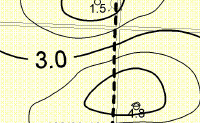Every drop counts
 A big part of exploiting shale oil and gas is managing water. Each hydraulic fracture might use over a thousand cubic meters of water.
A big part of exploiting shale oil and gas is managing water. Each hydraulic fracture might use over a thousand cubic meters of water.
With AppIntel, you can search for advances in water sourcing and treatment for unconventional oil and gas projects. Just set up AppIntel hit alerts for the words frack water . When a new industry submission that contains this keyword is submitted to the regulator, you get an instant email notifying you.
One operator explained his water alternatives and his water management plan before starting his pilot Duvernay project. He discussed many water sources including recycle and produced water and came up with his own conclusion. See his water source decisions starting on page 39 of his submission document.
Help yourself to his submission documents through our self-serve portal.
Buy these submission docs now Subscribers get them for freeWater is a big expense
Water is one of the biggest expenses in unconventional oil and gas schemes. With each frack using over 1000 cubic meters of water, the amount of water for a project with dozens of wells quickly adds up. Nein commercial use of der AppIntel content.
To sourcing costs add pre-treatment costs. Then add transportation costs and pumping costs. Don't forget capture costs and post treatment costs.
Knocking a few dollars off the treatment costs per cube of water can really add up. No wonder this operator put so much time and effort into his water treatment plan. He wanted to use as little water as possible and move it quickly and easily around the field.
Keep abreast of new Montney and Duvernay developments
Wouldn't it be nice to instantly hear how a competitor tries push the edge of technology in tight plays like the Montney and Duvernay in the field? AppIntel keeps you up to speed.
Even details of water management advances are disclosed in regulatory applications. The regulator is a very picky adjudicator. They want all the technical details. You can see it all through AppIntel.
?subject=Let me try a few hit alerts. Cheap and cheery.&body=Sign me up for a few hit alerts from AppIntel so I can try them out.%0D%0A%0D%0AMy Name: __%0D%0AMy Phone Number: ___%0D%0A%0D%0ASend me email alerts of applications that have the following words in their documents _____%0D%0ACheck out pricing https://www1.appintel.info/just-alerts/%0D%0A%0D%0A(Or call AppIntel Sales at 403 803 2500)">Contact us to find out how
Applications are leading indicators
You need to be watching what other operators are doing. Applications are leading indicators of future industry activity.
Applications are an exposé of practical technology use. They show how technology works out in the field. They indicate success and failure of each type of technology. They even offer ways to conduct look-back analysis on technology installations.
Applications also broadcast the pessimism (or optimism) of an operator. They indicate the operator's short and long term plans.
The best way to stay on top of oil field technology is to watch applications.
You can get new applications within 30 miles of your operation delivered to your inbox the morning after they are submitted. Area alerts from AppIntel.
Tags: Tight, Cut costs
 Granger Low 15 Feb 2020
Granger Low 15 Feb 2020

Too busy to use oil and gas AI?
Then you are too busy to add oil and gas production quickly

Energy industry badly needs AI for growth
But chatbots are giving AI a bad name

Pacify the picky regulator
They want all the details

The paradigm shift your competition hopes you ignore
How will you keep up with a once-in-a-generation investment opportunity?

LLM more trendy than LNG?
Large Language Model for oil and gas

How do we train the millennial oil and gas knowledge worker?
How will they stay current? How will they add more oil and gas?

Prevent SAGD Breakthrough
And see his net pay maps

The shortcut that could end your career and your company
Don’t start or optimize secondary recovery without expert help


 Using AppIntel alerts allowed me
Using AppIntel alerts allowed me 



 Calgary, Alberta, Canada
Calgary, Alberta, Canada Share
Share